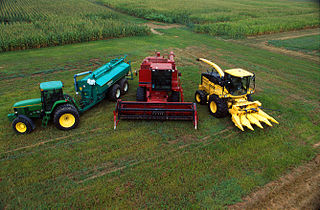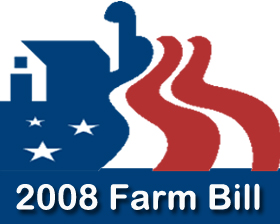
Biotechnology is a multidisciplinary field that involves the integration of natural sciences and engineering sciences in order to achieve the application of organisms, cells, parts thereof and molecular analogues for products and services.

An agricultural subsidy is a government incentive paid to agribusinesses, agricultural organizations and farms to supplement their income, manage the supply of agricultural commodities, and influence the cost and supply of such commodities.
Crop insurance is insurance purchased by agricultural producers and subsidized by a country's government to protect against either the loss of their crops due to natural disasters, such as hail, drought, and floods ("crop-yield insurance", or the loss of revenue due to declines in the prices of agricultural commodities.

E85 is an abbreviation typically referring to an ethanol fuel blend of 85% ethanol fuel and 15% gasoline or other hydrocarbon by volume.

Genetically modified crops are plants used in agriculture, the DNA of which has been modified using genetic engineering methods. Plant genomes can be engineered by physical methods or by use of Agrobacterium for the delivery of sequences hosted in T-DNA binary vectors. In most cases, the aim is to introduce a new trait to the plant which does not occur naturally in the species. Examples in food crops include resistance to certain pests, diseases, environmental conditions, reduction of spoilage, resistance to chemical treatments, or improving the nutrient profile of the crop. Examples in non-food crops include production of pharmaceutical agents, biofuels, and other industrially useful goods, as well as for bioremediation.
Food politics is a term which encompasses not only food policy and legislation, but all aspects of the production, control, regulation, inspection, distribution and consumption of commercially grown, and even sometimes home grown, food. The commercial aspects of food production are affected by ethical, cultural, and health concerns, as well as environmental concerns about farming and agricultural practices and retailing methods. The term also encompasses biofuels, GMO crops and pesticide use, the international food market, food aid, food security and food sovereignty, obesity, labor practices and immigrant workers, issues of water usage, animal cruelty, and climate change.

Genetically modified food controversies are disputes over the use of foods and other goods derived from genetically modified crops instead of conventional crops, and other uses of genetic engineering in food production. The disputes involve consumers, farmers, biotechnology companies, governmental regulators, non-governmental organizations, and scientists. The key areas of controversy related to genetically modified food are whether such food should be labeled, the role of government regulators, the objectivity of scientific research and publication, the effect of genetically modified crops on health and the environment, the effect on pesticide resistance, the impact of such crops for farmers, and the role of the crops in feeding the world population. In addition, products derived from GMO organisms play a role in the production of ethanol fuels and pharmaceuticals.

The Farm Security and Rural Investment Act of 2002, also known as the 2002 Farm Bill, includes ten titles, addressing a great variety of issues related to agriculture, ecology, energy, trade, and nutrition. This act has been superseded by the 2007 U.S. Farm Bill.

Corn ethanol is ethanol produced from corn biomass and is the main source of ethanol fuel in the United States, mandated to be blended with gasoline in the Renewable Fuel Standard. Corn ethanol is produced by ethanol fermentation and distillation. It is debatable whether the production and use of corn ethanol results in lower greenhouse gas emissions than gasoline. Approximately 45% of U.S. corn croplands are used for ethanol production.

In the United States, the farm bill is comprehensive omnibus bill that is the primary agricultural and food policy instrument of the federal government. Congress typically passes a new farm bill every five to six years.

The Food, Conservation, and Energy Act of 2008 was a $288 billion, five-year agricultural policy bill that was passed into law by the United States Congress on June 18, 2008. The bill was a continuation of the 2002 Farm Bill. It continues the United States' long history of agricultural subsidies as well as pursuing areas such as energy, conservation, nutrition, and rural development. Some specific initiatives in the bill include increases in Food Stamp benefits, increased support for the production of cellulosic ethanol, and money for the research of pests, diseases and other agricultural problems.

Food versus fuel is the dilemma regarding the risk of diverting farmland or crops for biofuels production to the detriment of the food supply. The biofuel and food price debate involves wide-ranging views, and is a long-standing, controversial one in the literature. There is disagreement about the significance of the issue, what is causing it, and what can or should be done to remedy the situation. This complexity and uncertainty is due to the large number of impacts and feedback loops that can positively or negatively affect the price system. Moreover, the relative strengths of these positive and negative impacts vary in the short and long terms, and involve delayed effects. The academic side of the debate is also blurred by the use of different economic models and competing forms of statistical analysis.
The agricultural policy of the United States is composed primarily of the periodically renewed federal U.S. farm bills. The Farm Bills have a rich history which initially sought to provide income and price support to US farmers and prevent them from adverse global as well as local supply and demand shocks. This implied an elaborate subsidy program which supports domestic production by either direct payments or through price support measures. The former incentivizes farmers to grow certain crops which are eligible for such payments through environmentally conscientious practices of farming. The latter protects farmers from vagaries of price fluctuations by ensuring a minimum price and fulfilling their shortfalls in revenue upon a fall in price. Lately, there are other measures through which the government encourages crop insurance and pays part of the premium for such insurance against various unanticipated outcomes in agriculture.

The Agriculture Risk Protection Act of 2000 made major revisions to the United States' federal crop insurance program and provided emergency agricultural assistance. The crop insurance provisions significantly increased the program's government subsidy; improved coverage for farmers affected by multiple years of natural disasters; and authorized pilot insurance programs for livestock farmers and growers of other farm commodities that were not served by crop insurance, among many other provisions. The emergency provisions made available a total of $7.14 billion in emergency farm assistance, mostly in direct payments to growers of various commodities to compensate for low farm commodity prices.
The American Corn Growers Association (ACGA) is a commodity and advocacy association founded in 1987 to represents the interests of corn (maize) producers in the United States, where corn is used for human and animal food and to produce ethanol. A rival group, the National Corn Growers Association, is seen as more closely aligned with the food processing industry.

Agriculture in India is highly susceptible to risks like droughts and floods. It is necessary to protect the farmers from natural calamities and ensure their credit eligibility for the next season. For this purpose, the Government of India introduced many agricultural social insurances throughout the country, the most important one of them being Pradhan Mantri Fasal Bima Yojana.
The Farmer Assurance Provision refers to Section 735 of US H.R. 933, a bill that was passed by the Senate on March 20, 2013, and then signed into law as part of the Consolidated and Further Continuing Appropriations Act, 2013 by President Barack Obama on March 26, 2013. The provisions of this law remained in effect for six months, until the end of the fiscal year on September 30, 2013. The Farmer Assurance Provision was discontinued in Sec. 101 of the Continuing Appropriations Act, 2014. The bill is commonly referred to as the "Monsanto Protection Act" by its critics.

The production of corn plays a major role in the economy of the United States. The US is the largest corn producer in the world, with 96,000,000 acres (39,000,000 ha) of land reserved for corn production. Corn growth is dominated by west/north central Iowa and east central Illinois. Approximately 13% of its annual yield is exported.
The North Carolina Growers Association (NCGA) is a -profit growers' cooperative based in the United States state of North Carolina that helps farmers in the state get native born US Citizens work as temporary agricultural laborers.
Genetic engineering in North America is any genetic engineering activities in North America










